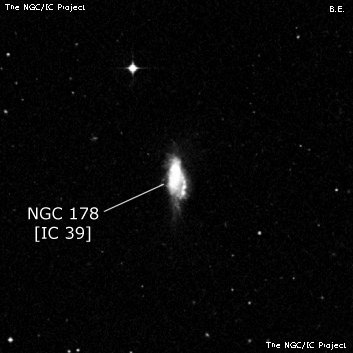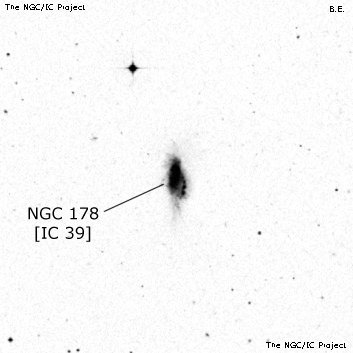NGC/IC Project Restoration Effort
(This is a very very beta version)
NGC178


Basic Information
Location and Magnitude
Right Ascension: 0:39:8.4
Declination: -14:10:20
Constellation: CET
Visual Magnitude: 12.6
Historic Information
Discoverer: Stone
Year of discovery: 1885
Discovery aperture: 26.3
Observational
Summary description: F, S, mE 0°, bM
Sub-type: Sb/P
Corwin's Notes
=====
NGC 178 = IC 39. The IC identity is not in doubt. Javelle's micrometric
measurement reduces to within a few arcsec of the modern position.
The NGC number, though, comes from one of Ormond Stone's Leander McCormick
discoveries with its typically bad RA. Stone's declination is fortunately
close, and his description "F, S, mE 0 deg, bM, faint wing sp" fits the galaxy
perfectly. The "faint wing" is, in fact, one of the arms of this object. I
wonder if this is a superposition of two galaxies, or an interacting system.
Stone has left a sketch of his nebula -- my rather poor copy of it shows the
"wing" faintly. Unfortunately, the sketch shows only the galaxy; no nearby
stars are included, so the identity is not quite pinned down. At least the
galaxy itself is oriented along the north-south axis of the sketch with the
"wing" apparently stretching off towards the southwest.
Herbert Howe found the galaxy 1min 37sec following Stone's position, so the
corrected position made it into the IC2 Notes. Unfortunately, Dreyer did not
notice that the object is the same as IC 39, so the identity of the two
numbers was not published until one of the Helwan observers noticed it.
Steve's Notes
=====
NGC 178
24" (9/30/16): at 282x; fairly bright, fairly large, elongated 5:2 N-S, ~1.5'x0.6'. Appears mottled along the major axis with a brighter knot or region at the north end [HST image reveals this is a giant star-forming region]. The galaxy appears to spread or bulge out with a faint extension on the southwest side [the HST image shows this is a series of HII/star-forming clumps]. This highly disrupted galaxy lies 8' NE of mag 9.0 HD 3579. Brightest in a trio with NGC 207 8.7' SE and IC 41 7.8' E.
17.5" (11/6/93): moderately bright, fairly large, elongated 5:2 N-S, 1.8'x0.8', broad low concentration but no nucleus. NGC 207 is in the field 9' ESE and NGC 210 lies 27' NE.
13" (8/24/84): fairly faint, fairly small, weak concentration, elongated 2:1 N-S, lies 27' SW of NGC 210.



